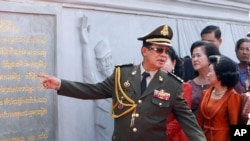Prime Minister Hun Sen has marked the 40th anniversary of the overthrow of the Khmer Rouge regime by praising his government’s “Win-Win” policy and attacking members of the former opposition party.
The Win-Win policy is credited with ending Cambodia’s long-running civil war in 1998 by allowing members of rebel factions, including the remnants of the Khmer Rouge, to integrate into the Cambodian military.
Speaking to thousands of supporters and officials on Monday at the Olympic Stadium in Phnom Penh, Hun Sen, himself a former Khmer Rouge commander, said his policy had “ended completely the chronic civil war” and brought “full peace” to the country.
“Cambodia, which used to be full of killing fields and dominated by the dictatorship regime and horrific genocidal regime, now becomes a land of freedom with full respect for pluralistic democracy through the regular organization of free and fair elections,” he said.
Cambodia held a national election in July last year. Before the poll, the ruling Cambodian People’s Party oversaw the banning of the country’s main opposition party, jailed its leader on questionable treason charges, and imposed restrictions on civil society and independent media outlets.
Kem Sokha, the president of the banned Cambodia National Rescue Party, remains under house arrest.
Hun Sen told the crowd on Monday that Cambodia did not need a strong opposition party as evidenced by the overwhelming victory for the CPP in July.
Despite the CPP’s success in the vote, the second-largest share of the votes were spoiled ballots.
But Hun Sen said the results “reflect clearly that Cambodians are the masters of their national fate” and had “rejected the activities of extreme opposition politicians”.
Rights workers and activists also question the prime minister’s account of his rule.
Theng Savoeun, director of local NGO Coalition of Cambodian Farmer Community (CCFC), which has been the target of harassment from the authorities in recent months, said impunity still reigned in Cambodia.
He pointed to a violent crackdown on striking garment workers and the CNRP in 2014 that led to several deaths, as well as continued pressure on civil society groups.
“We have to push for a single standard for the judicial system. We can’t have double standards exist today,” he said.
“Social injustice persists because there are two standards of legal enforcement in Cambodia: if you have powerful supporters behind you, you can freely organize an event. But for us unionists, association groups and victims’ groups that want to organize an event, we are treated badly by the authorities.”







